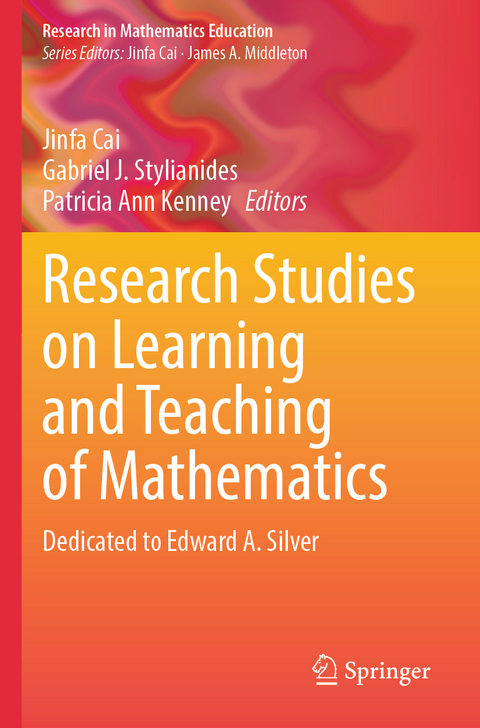
Research Studies on Learning and Teaching of Mathematics
Springer International Publishing (Verlag)
978-3-031-35461-8 (ISBN)
This book is about promising research advancements that sparked directly or indirectly from intellectual contributions by distinguished internationally recognized mathematics educator and researcher, Edward A. Silver. The features of this book include:
- A focus on the research areas that have benefited from Dr. Silver's intellectual contributions and influence, such as designing instructional tasks, problem posing, problem solving, preservice teacher learning, in service teacher professional development, and mathematics assessment
- Chapters written by contributors who at one time were his doctoral or post-doctoral colleagues along with any invited co-authors
- A brief bio of Dr. Silver showing his intellectual journey, key milestones in his career, and scholarly accomplishments that sparked from his intellectual contributions
Jinfa Cai is the Kathleen and David Hollowell Professor of Mathematics Education at the University of Delaware, and a Fellow of American Educational Research Association. He served as the Editor-in-Chief for the Journal for Research in Mathematics Education. He has also served as Program Director at the USA National Science Foundation. He was the Editor of the 2017 Compendium for Research in Mathematics Education. He has received several important awards, including the University of Delaware's College of Arts and Sciences' Outstanding Scholarship Award. He also received the Webber Award (honoring his significant contribution to the State of Delaware's mathematics education). Recently, he has focused his research on mathematical problem posing.
Gabriel Stylianides is Professor of Mathematics Education at the University of Oxford and Fellow of Oxford's Worcester College (UK). His research focuses on issues related to the meaningful engagement of students in fundamental mathematical practices. He has published 4 books and over 90 other articles in refereed journals, conference proceedings, or edited volumes. His research received support from the US National Science Foundation, the US Department of Education, the Education Endowment Foundation, the Spencer Foundation, and the John Fell Fund. He is currently an Editorial Board member of the Elementary School Journal, the Journal of Mathematical Behavior, the International Journal of Educational Research, and Asian Journal for Mathematics Education.Patricia Ann Kenney had an atypical journey into the field of mathematics education. With a bachelor's degree in English and a master's degree in library (information) science, she started her career in 1974 as a university librarian. She returned to higher education to earn a second bachelor's degree in mathematics (1981) and then a Ph.D. in mathematics education (1988). She did a post-doctoral fellowship under the tutelage of Dr. Edward A. Silver at the University of Pittsburgh (Pennsylvania, USA) Learning Research and Development Center (1990-92), and then worked with him for nearly 20 years in a variety of capacities, most of which involved writing articles and book chapters as well as editorial work on publications such as the Journal for Research in Mathematics Education, the National Council of Teachers of Mathematics National Assessment of Educational Progress interpretive reports, and the More Lessons Learned from Research series. These experiences allowed her to utilize her background in English, research, and mathematics to the benefit of those with whom she worked.Chapter 1: Mathematical Problem-Posing Research: Thirty Years of Advances Building on the Publication of "On Mathematical Problem Posing".- Chapter 2: Professional Learning Tasks Through Job-Embedded Teacher Professional Development.- Chapter 3: To What Extent Are Open Problems Open? Interplay Between Problem Context and Structure.- Chapter 4: The Researcher and the Practitioner: Stories About Establishing Pipelines, Building Bridges, and Crossing Borders.- Chapter 5: Understanding and Improving Mathematics Instruction Through a Cultural Lens.- Chapter 6:From Mathematical Tasks to Research-Practice Partnerships: A Look at Edward Silver's Influence on our Efforts at Mathematics Instructional Improvement.- Chapter 7: Desirable Features of Mathematical Tasks: Views of Mathematics Teacher Educators.- Chapter 8: Parental Involvement in Young Children's Mathematical Learning: The Story of Family Math Tasks.- Chapter 9: Engaging All Students in Challenging Mathematical Work: Working at the Intersection of Cognitively Challenging Tasks and Differentiation During Lesson Planning and Enactment.- Chapter 10: A Review of the Mathematical Tasks Framework and Levels of Cognitive Demand.- Chapter 11: A Critical Discursive Framework for Analyzing the Views About Mathematics Being Promoted by Mathematics Textbooks for Prospective Elementary Teachers.- Chapter 12: Mathematical Tasks: The Lasting Legacy of the QUASAR Project.- Edward A Silver bio sketch
"This book, dedicated to Edward A. Silver and the areas and projects benefiting from his influence, is a collection of a dozen essays on the skillful use of problem posing as an instrument to enhance mathematics instruction and learning, and should be of interest and benefit to anyone involved in mathematics education." (Russell Jay Hendel, MAA Reviews, February 29, 2024)
| Erscheinungsdatum | 10.08.2024 |
|---|---|
| Reihe/Serie | Research in Mathematics Education |
| Zusatzinfo | XXI, 308 p. 53 illus., 23 illus. in color. |
| Verlagsort | Cham |
| Sprache | englisch |
| Maße | 155 x 235 mm |
| Gewicht | 505 g |
| Themenwelt | Mathematik / Informatik ► Mathematik |
| Sozialwissenschaften ► Pädagogik ► Schulpädagogik / Grundschule | |
| Schlagworte | doctoral and post-doctoral mentoring in mathematics education • Edward A. Silver • Equity in mathematics education • History of Mathematics Education • linking research to practice • mathematical assessment • mathematical tasks • Pre-service teacher education • Problem Posing in Mathematics Education • problem solving in mathematics education • teacher professional learning |
| ISBN-10 | 3-031-35461-3 / 3031354613 |
| ISBN-13 | 978-3-031-35461-8 / 9783031354618 |
| Zustand | Neuware |
| Haben Sie eine Frage zum Produkt? |
aus dem Bereich


